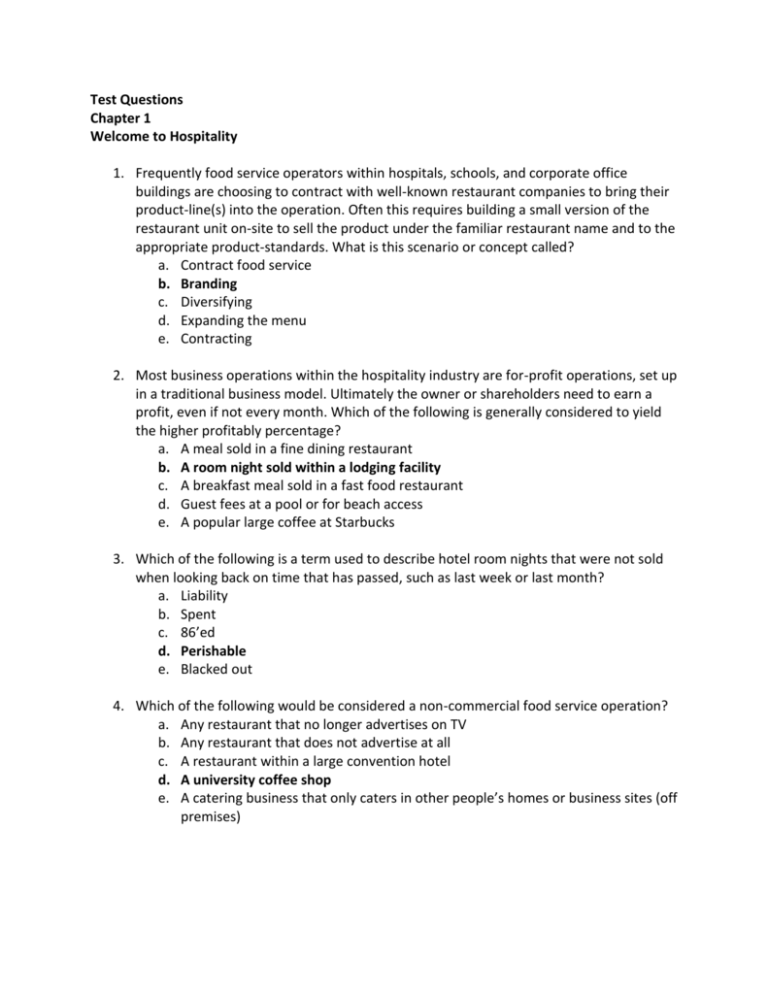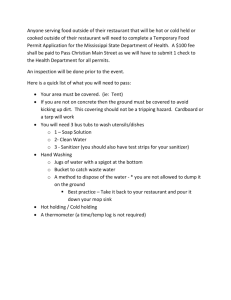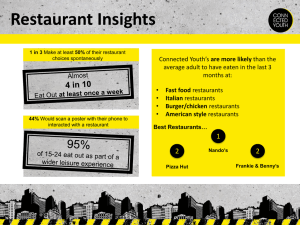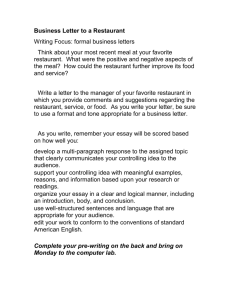Test Questions Chapter 1 Welcome to Hospitality Frequently food
advertisement

Test Questions Chapter 1 Welcome to Hospitality 1. Frequently food service operators within hospitals, schools, and corporate office buildings are choosing to contract with well-known restaurant companies to bring their product-line(s) into the operation. Often this requires building a small version of the restaurant unit on-site to sell the product under the familiar restaurant name and to the appropriate product-standards. What is this scenario or concept called? a. Contract food service b. Branding c. Diversifying d. Expanding the menu e. Contracting 2. Most business operations within the hospitality industry are for-profit operations, set up in a traditional business model. Ultimately the owner or shareholders need to earn a profit, even if not every month. Which of the following is generally considered to yield the higher profitably percentage? a. A meal sold in a fine dining restaurant b. A room night sold within a lodging facility c. A breakfast meal sold in a fast food restaurant d. Guest fees at a pool or for beach access e. A popular large coffee at Starbucks 3. Which of the following is a term used to describe hotel room nights that were not sold when looking back on time that has passed, such as last week or last month? a. Liability b. Spent c. 86’ed d. Perishable e. Blacked out 4. Which of the following would be considered a non-commercial food service operation? a. Any restaurant that no longer advertises on TV b. Any restaurant that does not advertise at all c. A restaurant within a large convention hotel d. A university coffee shop e. A catering business that only caters in other people’s homes or business sites (off premises) 5. Which segment of the hospitality industry is growing at an incredibly fast pace? a. Urban lodging b. Resorts c. Food services d. Bars and nightclubs e. Spas and Fitness Centers 6. Who owns most private clubs? a. They are locally run by the county or city b. The real estate developers who built the nearby houses or subdivision c. Its members d. The majority are corporate owned and operated 7. What segment in the food service industry is considered to be the largest? a. Casual dining restaurants b. Family dining restaurants c. Fine dining restaurants d. Fast food restaurants e. Non-commercial food service operations 8. What is fusion cuisine? a. When a chef blends flavors from different cuisines b. When a chef cooks with fusion energy c. When a chef blends nightly specials into a partially set menu (i.e. fused together) d. When a chef cooks only with local or organic ingredients e. Fusion is a type of vegetarian cuisine, meaning no dairy or eggs 9. The service product is intangible, which can best be described by: a. You cannot take it back once it is delivered b. It is not a physical object that you can touch c. It cannot be counted or measured d. All of the above describe the statement 10. What is the definition of the “moments of truth”? a. Any time the guest comes in contact with anything that represents the operation b. Can be positive or negative c. Any time the guest voices a complaint to a staff member or manager about something they experienced in the operation d. All of the above 11. Which economic segment is currently the dominant contributor to the United States economy? a. Agriculture b. Importing & exporting c. Manufacturing d. Service 12. Which of the following is NOT one of the three separate parts of the economy described in this book? a. Agriculture b. Imports & Exports c. Manufacturing d. Service 13. In the very high end lodging segment of the industry, it is likely the employee-to-guest ratio will be ____employees : one guest. a. 2 b. 3 c. 4 d. 5 e. 6 or more 14. One of the unique challenges of any service industry is that the consumer or guest is a variable which can affect the success of the service experience. Much of the success factor is determined by the guests’ perception, not the hotel or restaurant company or its management team. Which variable below is totally up to the operation’s management to create or ensure? a. Consistency b. Moments of truth c. Value d. Quality e. Attitude 15. The hospitality industry is considered to be a “people” business. Which skill listed below is particularly crucial to this aspect of becoming a successful manager in the hospitality industry? a. Leadership skills b. Time management skills c. Interpersonal skills d. Technological skills e. Problem solving skills




